- Home
- L. R. Patton
The Perilous Crossing Page 2
The Perilous Crossing Read online
Page 2
And so the men in Sir Greyson’s army remain. They see their provisions sent to their wives and mothers. They try to forget the village that holds no laughter. They try to do their duty and carry on.
“They were in the forest,” King Willis says. “And where are they now?”
Sir Greyson swallows. He does not know. His men do not know. But he does not confess his not-knowing to the king. “We will find them,” he says instead. “Here is our first clue.” He holds the shoe up so the king can see it again. King Willis squints, but as far as his eyesight is concerned, there is nothing in Sir Greyson’s hand.
Prince Virgil, however, feels another hope, a darker hope, take root.
Perhaps they will be found. Perhaps his throne will be secured, without the gift of magic. Perhaps he will rule the land after all.
You must understand, reader. Prince Virgil, though once a kind boy, has listened, day after day, to the stories of his father, stories of grandeur and fame, and once dreams of grandeur and fame crawl inside a heart, a man (or woman or boy or girl) will do anything to see them come to pass. Everyone wants to be a part of history. Prince Virgil would be among the names of the Fairendale kings, a most revered calling. He would be feared and respected and, mostly, remembered. He does not know that one can be remembered, too, for the evil one brought to the world, and this is not a fame most would want.
Some, alas, will take fame in whatever package it comes. Prince Virgil is not so far gone as this, but he is coming closer every day, for every hour he spends sitting on his father’s throne, though King Willis does not permit it often just yet, is another hour that the light and the dark in Prince Virgil’s heart battles.
“Go, then,” King Willis says. “Find them.” He looks at his son, his lips pulled into a grin. “And when you do, bring them to me.”
“Yes, sire,” Sir Greyson says. He clutches the shoe in his palm, turns on his heel and strides toward the double doors at the back of the room. His men wait just outside the castle for new orders.
And perhaps the sound of the doors swinging open and clanking closed pulls our prince from the enchantment of this room, this throne, this king, for it is when Sir Greyson has disappeared that Prince Virgil feels the sudden twisting of his stomach.
King Willis is looking at his son. “A feast to celebrate,” the king says. “They shall be found. As we knew they would.”
Prince Virgil, truth be told, does not feel much like eating. He does not feel much like anything but following on the heels of soldiers who will search the forest once again. He would warn the children. He would bid them run. He does, after all, still love three of them. Are they alive? Are they safe?
Perhaps he might sneak out of the castle tonight and warn them. Would he be brave enough to venture into the forest?
No, of course not. He has heard the stories. The fairies. The goblins. The shape shifters. There are too many dangers. His friends, if they are in the forest, will not be there for long.
But what if the men find his friends? What if they bring them to his father? What if they die?
Do you see, dear reader, what goes on in the heart of our prince? It is not so very easy to be a prince. It is not so very easy to feel the pull of fame and the love of three people. It is not so very easy to choose between power and love.
“It is only a matter of time,” King Willis says. He pats his son, but Prince Virgil does not look at his father’s face, for the spell, for now, has been broken. “They will pay.”
“Yes,” Prince Virgil says. “They will pay.” He does not mean the words, of course. For in his heart, he whispers his treason. Do not let them have Theo or Mercy or Hazel.
Love, you see, is a powerful thing.
BENEATH the ground, in their home with dirt walls and floor and wooden furniture made by the deft hands of Arthur, the children do not know whether it is day or night. They have felt the vibrations of horses and men above ground, and they find themselves inclined to fall asleep to the gentle rhythm. It is not time for sleeping, though dusk is near, but the children have nothing better to do. They eat what little food is left, and then they take to their beds, trying not to think about their great thirst that will widen in the coming hours. Arthur and Maude hole up in their own bedroom. Hazel follows Mercy to the one they share, the other girls retiring to their own. Bunks fold into the earth in a quite remarkable way. One has only to touch a staff to the ground, and out the beds come. Hazel and Mercy sit on Hazel’s perfectly made bed. They do not speak for a time. Mercy fingers the blanket that wrinkles where they sit. Hazel’s bed looks much different than her own, for Mercy could never see the point of making a bed she would sleep in again.
There is so much to be said between the two friends, but they do not quite know how to say it.
Hazel, who keeps a rigid back most of the time, slumps on the bed. “I do not know what we will do,” she whispers, as if she wants no one else to hear her, though the other girls are tucked away in their own rooms. “I do not know how we will survive.”
Mercy takes her friend’s hand. “We will survive,” she says. “We did not come so far to give up so easily.”
“But we have no more food,” Hazel says. “We have no water.” She looks at her friend, as if afraid of the words she has just said. “I am sorry. I do not mean it is your fault.”
Mercy dips her head. “We are all doing what we can,” she says. “It is not easy with our hunger.”
“No,” Hazel says. “We thought we were hungry in the village.” Her voice catches at the end of it, for Hazel loved her village home and misses it now. She misses, too, the sheep she used to lead, every morning and afternoon, to the freshwater cove for a drink and then back to their grazing fields. She even misses the taunts of the mermaids.
Mercy puts an arm around Hazel’s shoulders. Hazel leans on her friend.
“I miss Theo,” Hazel says.
Mercy nods against the top of her head. “Me too,” she says.
They both wonder the same questions, but they do not dare wonder aloud. Is he still alive? Has he been captured? Will he find safety?
“I know he is alive,” Hazel says into the silent chasm. “I would feel it if he was not.” In truth, Hazel has grown weaker and weaker every day. She fears it is because her twin grows weaker and weaker every day. She hopes it is merely the hunger. But she has little magic left, if any. It is known that a twin dying strips the magic from the remaining twin. Hazel looks at her staff, resting in the corner with Mercy’s. She longs to try. To know. But she does not dare.
“No,” Mercy says, as if she knows precisely what it is her friend is thinking. “You must not try. You must not waste what little magic remains.”
“But what if there is none left?” Hazel says. She feels the fear burning her eyes. She blinks them.
“There is,” Mercy says.
“But we do not know for sure,” Hazel says.
“We must trust,” Mercy says. “And we must rest.”
Mercy climbs to her bed above Hazel’s, and the girls lie in their separate places, joined by the minds that do not give in so easily to sleep.
We must rest so we can die, Hazel thinks.
It may work, Mercy thinks.
For Mercy, you see, has a plan.
ACROSS the dirt hall, Arthur and Maude sit on their bed in much the same way Mercy and Hazel did. They sit close, their shoulders touching. Maude slumps. Arthur straightens. They think and do not speak, until Arthur says, “I am sorry.”
Arthur, you see, feels as if this burying, this trap beneath the ground, is his fault. It was, after all, his idea to create an underground portal, held in place by a tiny shoe. Perhaps he should have chosen something more permanent. A boulder. A tree. A cave. But a tiny shoe. What are the odds that someone would find a tiny shoe? What are the odds that it would be disturbed from its place, deep in the woods? The king’s men must be growing desperate. He should have known.
And now they are trapped, unable to escape. They
have eaten their last bowl of carrot soup, for there are no more carrots, and there is no more water. What will they do? How will they survive? Magic has its limits. It cannot keep them alive.
“Oh, Arthur,” Maude says. She lays her head on his shoulder, as if they are the very picture of Hazel and Mercy, adults where children sat moments ago. Arthur strokes her hair. He ponders in silence. Maude nearly falls asleep, she is so exhausted. Fear, you see, does different things to different people.
Arthur listens to his wife’s gentle breathing. He moves his arm around her shoulder so that she falls against him. She is warm and beautiful, as she was all those years ago. He kisses the top of their head. They will die. There is no hope. There is no way out of this trap beneath the earth. And what strikes the most fear in the heart of a man like Arthur is that it will not be a quick and easy death. It will be a slow one. A torturous one. Perhaps it would have been better to let the king’s men catch the children in the very beginning. Perhaps he should have known they could not stay here forever. Perhaps he should not have ventured back into the lands of his youth.
“Okay, then,” Arthur says. Maude startles awake. “Sorry to wake you.”
“Okay then?” Maude says, her face brightening with hope, as if, perhaps, Arthur’s sudden words mean he has thought of a way out of death.
He shakes his head. He has only, you see, come to terms with dying. He turns to his wife and takes both of her hands in his. “It will not be an easy death,” he says.
“No,” Maude says.
“We will have to help the children,” Arthur says.
“Yes,” Maude says. Tears stream down her face. Arthur folds her in his arms.
“I am sorry, love,” he says. “I am sorry I failed you.”
“You did not fail us,” Maude says. “How could we have known what would happen?”
“It is an underground home,” Arthur says. “It is a portal. There are always dangers.”
“You kept us alive,” Maude says. Her voice is muffled against his chest. “For the time it mattered. And Theo...”
She does not finish her thought, but Arthur knows what she intended to say. Theo might yet be alive. And that matters for something as well, though it makes their dying that much more difficult. His son, alone. Where is he? Why had he run the other way, when the plan had been the woods? They might have used his magic, and Hazel’s, too.
Neither of them speaks for a time. And then Maude says, “Is there not something we can do, Arthur? Anything? Some little bit of magic left?”
Arthur shakes his head. “The children are too weak,” he says. “The magic would be more powerful than they are.” Everyone knows what happens when a magician cannot control his power. The magic will take over, turning good intentions to bad. Magic, you see, does not like its natural hierarchy. Magicians have always been stronger than magic. And so magic will take control wherever it might, which makes it quite dangerous for a magician to practice when he is already weak.
“What about Hazel?” Maude says. “Perhaps she has a bit left. She has not used any magic since we left the village.”
“She has been without Theo for far too long,” Arthur says. “Asking her to use what might be left would risk the loss of her magic forever.”
Maude knows this, of course. But she is thinking of the children. She is wondering if Hazel would do this for the children. “Is not life more important than magic?” Maude whispers. “Can one not live without magic?”
Arthur lets out a long breath. “Of course,” he says. “But then what?” He looks toward the ceiling. Maude pulls away.
“Then we escape,” she says.
“What is waiting in the woods?” Arthur says. “We do not know if it is night or day.”
“It matters not,” Maude says. “What is out there is nothing to what it is in here, what we face when the children wake from their sleep. Why not give them this hope? At least we will have tried.”
“The king’s men wait in the woods,” Arthur says.
“We will run,” Maude says. “As we did before.”
“We will run forever,” Arthur says. “They will never stop their pursuit.”
“I will run forever,” she says. “The children will run forever. To stay alive.”
Arthur shakes his head, but, in the end, he knows his wife is right. They will have to ask their daughter to use her magic. It is the only thing left.
And then they will have to risk whatever waits for them in the Weeping Woods.
THE shadows stretch long and narrow in the secret shelter beneath the village fountain. There is a woman here, a woman of bright green eyes and flame-colored hair, who looks like one of the children in our story.
She has, in fact, lost a child in this story.
And so she is desperate, as any mother would be, to save the children, for she loves her daughter with a great, unceasing love. She misses her daughter’s bright green eyes and flame-colored hair. She misses the magic her daughter made in their cottage, turning azaleas to roses, mending old shoes, making a blanket from a scrap of cloth to replace the one with holes in it. She had this gift once upon a time, though she never learned to tame it as her daughter had. There had not been an Arthur in the village when she was a girl.
There are other people who gather in this room. There are men who have lost sons and grandmothers who have lost grandchildren and mothers, like her, who have lost their daughters. They all want the same thing: the children returned. The children safe. The children back in their homes, back in the streets, back in a laughter-filled world.
“Where are they?” a man in the corner says. He has a gruff face, a gruff voice, a gruff appearance with his furry chin and wrinkled red tunic and brown breeches of varying length on each leg. The green belt tied about his waist is too loose, for the people of Fairendale do not fare well in these days after the children’s disappearance. There is no reason to eat, most of the time. Though when a body is hungry enough, it will eat. This man has lost his twin boys and an older son. He does not understand why his boys would be in danger at all, for they do not seek a throne. They do not have what it takes to rule a kingdom, for they were not born with magic. They are simply boys. Missing boys. Loved boys. Cora knows this man to be Garron, the village gardener.
“I do not know where the children are,” says the woman with flaming hair. “The dungeon, we hope.”
The people murmur. If one were standing in this candlelit room, one might hear words like, “The dungeon?” and “That is what we hope?” and “Surely not.”
“Do you think they are safe?” a woman says. Her eyes are red-rimmed, as if she has been crying. Many of the mothers, you see, have been crying since the day they lost their children. A mother, though not always grateful, perhaps, for the untidiness children bring to a home, always loves her children. It is, in fact, love that has brought them all here, though they wanted nothing more than to remain in their beds and wither away, as it seems the land of Fairendale has begun to do.
“No,” Cora says, though she would like nothing more than to say otherwise. “I do not think any children are safe in the kingdom now.”
“What will we do?” another woman calls out. Cora does not know these village people all that well, for she never had much need to know them. Her daughter studied magic with Arthur and Maude. She knows the baker, the shoemaker, the tailor, the book binder, the gardener. Only the ones she needs to know. She is accustomed to living a somewhat lonely life, for she was always different from the rest of them. But they need a leader, and a leader they shall have.
“We will go to war,” another man shouts, from the middle of the hunched crowd. The other villagers murmur their approval.
Cora knows that the people are untrained for something as violent as war. She has other plans, plans that will involve moving silently, bleeding the castle a day at a time. So she waits until the room has quieted once more, until the candles have settled into a straight-line flicker, rather than a reaching one.
<
br /> “No,” Cora says. “Not yet. Now is the time for planning. For building. For gathering strength and numbers.”
The people look at one another. They are gaunt and pale, with purple circles painting the undersides of their eyes. They do, in fact, look worse for wear, as they say. They look as if they may be dying, slowly, though if one were to look with eyes that could truly see, one would not see Death lurking in the shadows of Fairendale any longer. Death is satisfied, for now, though there is no knowing when his hunger will return.
Death, you see, has moved on to stand guard at another place, but we are getting ahead of ourselves.
“We must move before it is too late,” says a ragged man with black eyes. “Before the children are lost.”
“The children are already lost,” Cora says. “We shall find them again, bring them back to our homes, but our plans will take time.”
“Plans?” a woman says. A hooded cloak covers her body, bright red. It does not seem to fit, as if, perhaps, it belongs, instead, to a child. Might this woman have a missing child who used to wear this cloak? Why, yes. This woman is wearing her daughter’s cloak, and it is a tragic sight.

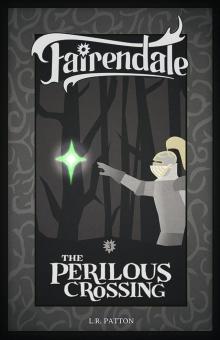 The Perilous Crossing
The Perilous Crossing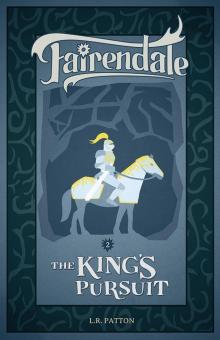 The King's Pursuit
The King's Pursuit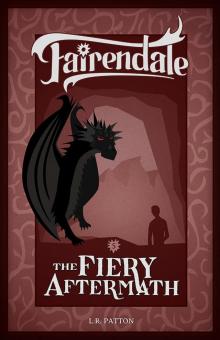 The Fiery Aftermath
The Fiery Aftermath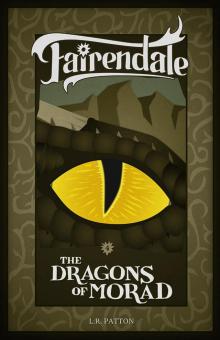 The Dragons of Morad
The Dragons of Morad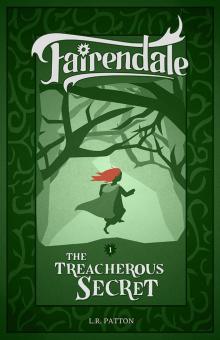 The Treacherous Secret
The Treacherous Secret